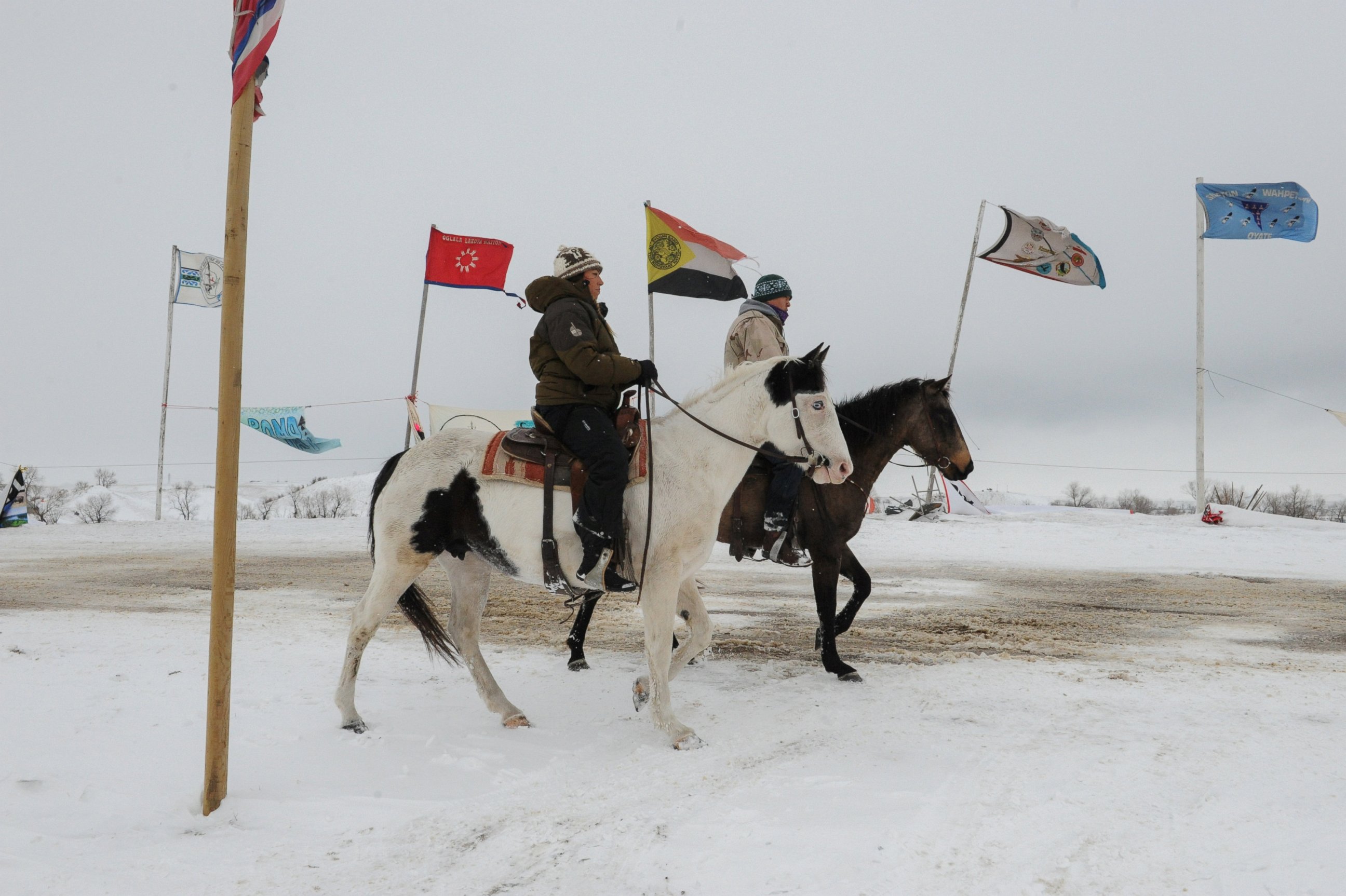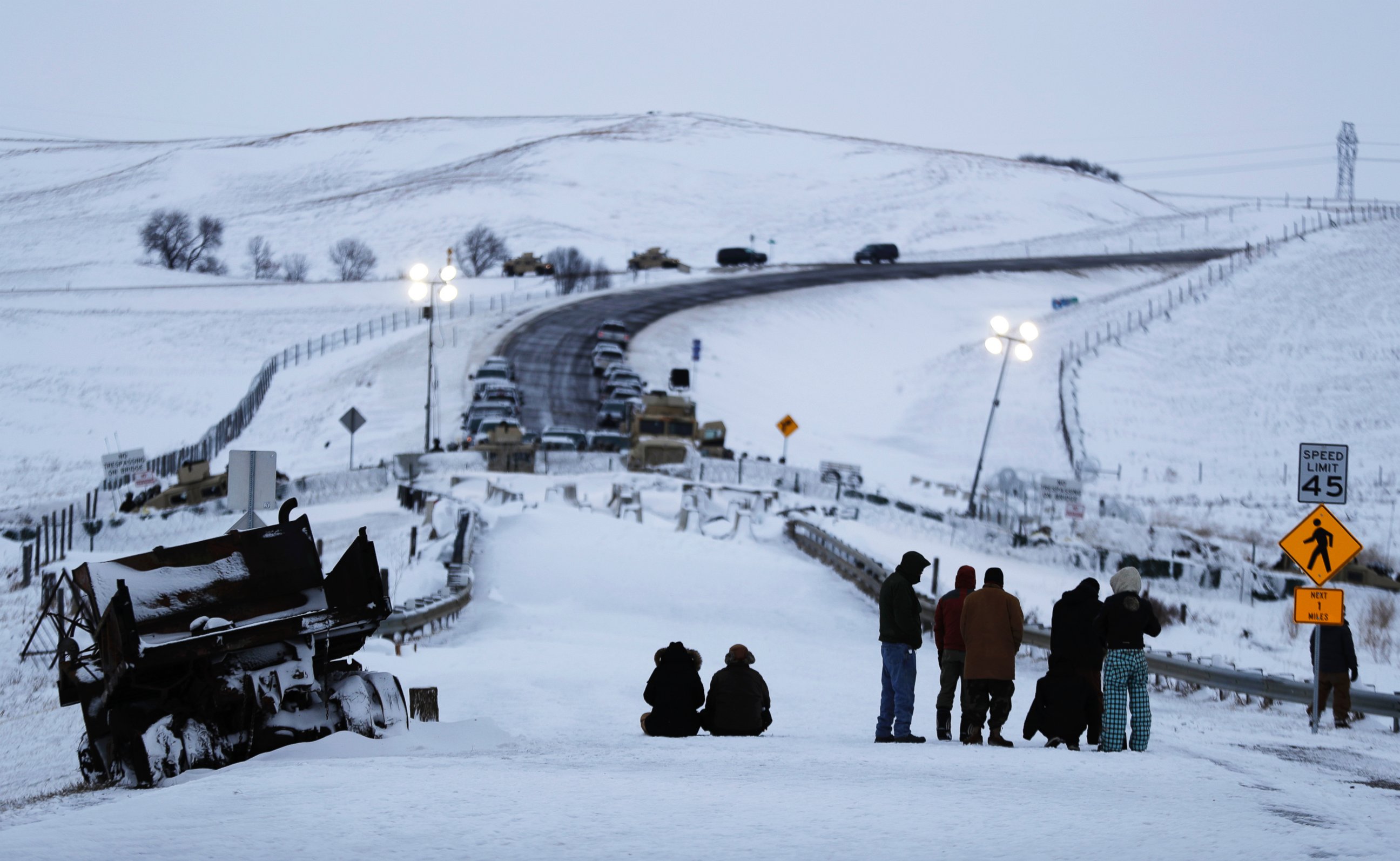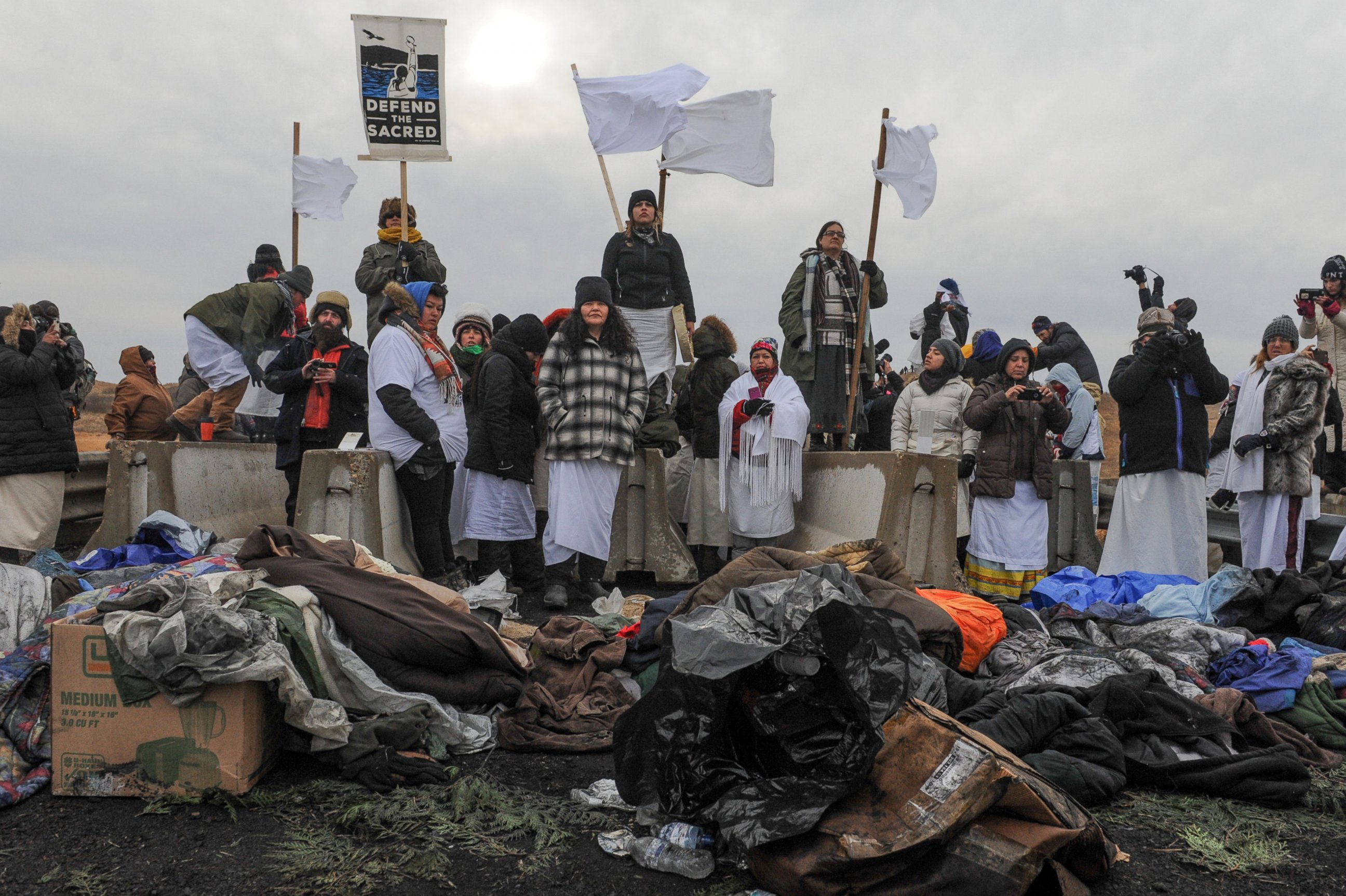Showdown Looms at Dakota Access Pipeline Protest as Vets, Civil Rights Observers Converge Before Evacuation Deadline
As evacuation deadline looms, veterans and civil rights observers converge.
— -- There may be a looming showdown in the coming days in the already contentious demonstrations in North Dakota against the Dakota Access Pipeline.
Local authorities have issued a mandatory evacuation order for the site near the Standing Rock Sioux Tribe's reservation where hundreds of activists are camping out in protest of the controversial crude oil pipeline. Those who have not cleared out by Monday could be arrested, authorities said.
Authorities said they issued this evacuation order as a safeguard against the winter conditions.
Meanwhile, a military veterans group announced that at least 2,000 vets would "deploy" to the area on Sunday to defend the demonstrators if local authorities move in to clear out the camp this weekend. In addition, the U.S. Commission on Civil Rights told ABC News on Friday that it would send commissioners to North Dakota because of the commission's civil rights concerns.
"We are concerned with numerous reports and testimony regarding the use of military-style equipment and excessive force against protesters," the USCCR said in a statement. "Our concerns are compounded by the disproportionate police use of excessive force against Native Americans, who are more likely than any other racial group to be killed by police."
Despite the looming possibility of confrontations, arrests and the below-freezing temperatures, many demonstrators said they will continue their protests.
"I'm not going anywhere," Terrell Iron Shell, 23, who came to Standing Rock from Rapid City, South Dakota, in early August, told ABC News from inside a yurt, a traditional nomadic home, erected on the contested land. "I'm willing to set my life on the line to protect this water, to protect this way of life, Unci Maka, mother earth. And so, I’m willing to do whatever it takes." Unci Maka is Lakota for "grandmother earth."
"I’m willing to give my life for this cause. I hope it doesn't come down to that. But you know Crazy Horse once said, 'Today is a good day to die,’” he added, referencing a historical Native American leader.
Iron Shell, a member of the Oglala Lakota Tribe, is one of the original members of the International Indigenous Youth Council, an advocacy group that has become known for its commitment to remaining peaceful during confrontations with police.
The activist is also a descendant of Chief Iron Shell, a widely respected Brule Sioux chief who was among the first tribal leaders to sign the 1868 Treaty of Fort Laramie, which established the Great Sioux Reservation, a vast territory that has since been cut down by acts of Congress into checkerboard remnants of its original version.
Iron Shell said there's a lot of talk among the protesters about what's going to happen on Monday.

Since this summer, Native American groups and environmental activists have been battling to block construction of the 1,172-mile pipeline that is slated to traverse four states and transport crude oil from North Dakota's oil fields to refinery markets in Illinois. The activists, who call themselves "water protectors," say that the pipeline traverses culturally sacred sites and poses a risk to the Standing Rock Sioux Tribe's water supply.
Kelcy Warren, CEO of Energy Transfer Partners, the Texas-based company behind the project, has argued that those claims are unfounded, writing in an internal memo to staff in September that "concerns about the pipeline’s impact on the local water supply are unfounded" and "multiple archaeological studies conducted with state historic preservation offices found no sacred items along the route."
Iron Shell said it's important that people understand the protesters’ concerns.
"We've been silent for so long, with the historical trauma that we face," he said. "A lot of these things that happened to us in the past, our identities were taken from us, our voices were taken from us, and now we have them back and we're fighting for the water, we're protecting the water."
Wesley Clarke, Jr., who is among those mobilizing fellow veterans, said on the GoFundMe page he established that he and fellow organizers "are calling for our fellow veterans to assemble as a peaceful, unarmed militia at the Standing Rock Indian Reservation." That GoFundMe campaign has raised over $900,000 in support.
Their mission is to "defend water protectors from assault and intimidation at the hands of the militarized police force and DAPL security," Clarke added.

The leader of the Standing Rock Sioux Tribe, Dave Archambault II, called on the United Nations and President Obama to "take immediate action to prohibit North Dakota from engaging in its retaliatory actions and practices," in response to the mandatory evacuation order issued for demonstrators by North Dakota Gov. Jack Dalrymple earlier this week.
“This week is the anniversary of the Sand Creek Massacre. It’s time for the United States to end its legacy of abuses against Native Americans," Archambault said in a statement Thursday.
“As a tribal nation, we call on the President to take all the appropriate steps to ensure water protectors are safe and that their rights to free speech and peaceful assembly are protected," Archambault added.

The advocacy group Amnesty International, which has dispatched a delegation of human rights observers to the protest site, sent a letter earlier this week to U.S. Attorney General Loretta Lynch, requesting that the Department of Justice investigate the "policing of the Dakota Access Pipeline demonstrators."
“[T]he Civil Rights Division should deploy observers to the area to ensure that the rights of people opposed to the pipeline are respected, protected and fulfilled," Amnesty International U.S. Executive Director Margaret Huang states in the letter. "Should your investigators uncover any civil rights violations by law enforcement, individual officers should be charged and prosecuted as warranted.”
Energy Transfer Partners filed for a court order two weeks ago asking for the right-of-way to complete construction of the pipeline without further intervention from the federal government. The court has yet to rule on the matter.
ABC News' Evan Simon contributed to this report from Cannon Ball, North Dakota.




